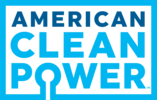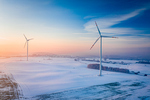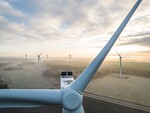News Release from American Clean Power Association (ACP)
Wind Industry Profile of
04/17/2012
AWEA - Minnesota fourth in wind power
Minnesota was the fourth most active state for adding wind power in 2011, according to the latest annual report from the American Wind Energy Association.
Minnesota installed 542 megawatts of wind energy during 2011, bringing the state's total installed capacity to 2,733 megawatts, the wind farm industry's annual report showed Thursday, April 12.
The additional wind capacity allowed Minnesota to hold on to its fifth place ranking for installed capacity.
Texas continued to lead the nation with 10,394 megawatts of installed capacity, followed by Iowa with 4,322 megawatts, California with 3,924 megawatts and Illinois jumping from seventh in 2010 to fourth in 2011 with 2,742 megawatts, according to AWEA's report.
The nation as a whole added 6,816 megawatts of wind energy in 2011, a 31 percent gain from 2010, for a total of 46,916 megawatts, AWEA said.
Developers in states across the nation are racing to put wind projects in the ground this year, before a production tax credit expires on Dec. 31.
AWEA officials predicted that if the production tax credit is not extended, wind energy development would grind to a halt, and it could mean the loss of 37,000 jobs.
"We can move forward - we just need a signal to do it," said Liz Salerno, AWEA's chief economist.
Minnesota's renewable energy standard, which calls for utilities to derive 25 percent of their electricity from renewables such as wind by 2025, would still be in force, but the industry looks like it's
hitting a lull, said Beth Soholt, executive director of Wind on the Wires, a regional trade group based in St. Paul
She acknowledged that wind energy would be competing with cheaper natural gas, which is selling at record low prices. She and other renewable advocates argue that wind energy has become more cost competitive and natural gas prices may not stay low as drillers shift to more lucrative oil exploration.
"I think all options would be on the table, and I still think the options are good for renewables," Soholt said.
Soholt said she believes the production tax credit will be renewed, but not until after the November elections.
A last-minute renewal could hurt wind development in 2013, though, she said. "We're in a rebuilding process right now," she said.
For more information on this article or if you would like to know more about what www.windfair.net can offer, please do not hesitate to contact Trevor Sievert at ts@windfair.net
www.windfair.net is the largest international B2B Internet platform – ultimately designed for connecting wind energy enthusiasts and companies across the globe!
Minnesota installed 542 megawatts of wind energy during 2011, bringing the state's total installed capacity to 2,733 megawatts, the wind farm industry's annual report showed Thursday, April 12.
The additional wind capacity allowed Minnesota to hold on to its fifth place ranking for installed capacity.
Texas continued to lead the nation with 10,394 megawatts of installed capacity, followed by Iowa with 4,322 megawatts, California with 3,924 megawatts and Illinois jumping from seventh in 2010 to fourth in 2011 with 2,742 megawatts, according to AWEA's report.
The nation as a whole added 6,816 megawatts of wind energy in 2011, a 31 percent gain from 2010, for a total of 46,916 megawatts, AWEA said.
Developers in states across the nation are racing to put wind projects in the ground this year, before a production tax credit expires on Dec. 31.
AWEA officials predicted that if the production tax credit is not extended, wind energy development would grind to a halt, and it could mean the loss of 37,000 jobs.
"We can move forward - we just need a signal to do it," said Liz Salerno, AWEA's chief economist.
Minnesota's renewable energy standard, which calls for utilities to derive 25 percent of their electricity from renewables such as wind by 2025, would still be in force, but the industry looks like it's
hitting a lull, said Beth Soholt, executive director of Wind on the Wires, a regional trade group based in St. Paul
She acknowledged that wind energy would be competing with cheaper natural gas, which is selling at record low prices. She and other renewable advocates argue that wind energy has become more cost competitive and natural gas prices may not stay low as drillers shift to more lucrative oil exploration.
"I think all options would be on the table, and I still think the options are good for renewables," Soholt said.
Soholt said she believes the production tax credit will be renewed, but not until after the November elections.
A last-minute renewal could hurt wind development in 2013, though, she said. "We're in a rebuilding process right now," she said.
For more information on this article or if you would like to know more about what www.windfair.net can offer, please do not hesitate to contact Trevor Sievert at ts@windfair.net
www.windfair.net is the largest international B2B Internet platform – ultimately designed for connecting wind energy enthusiasts and companies across the globe!
- Source:
- American Wind Energy Association
- Author:
- Posted by Trevor Sievert, Online Editorial Journalist
- Email:
- windmail@awea.org
- Link:
- www.awea.org/...
- Keywords:
- awea, wind, wind energy, wind turbine, rotorblade, awea, ewea, wind power, suppliers, manufacturers, renewable energy, trevor sievert



























